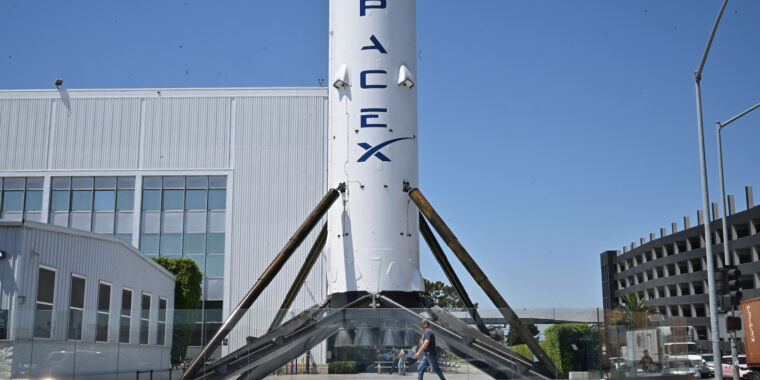Labor board confirms Amazon drivers are employees, in finding hailed by union
Driving a hard bargain —
“We are Amazon workers”: Delivery drivers celebrate labor board finding.

Amazon may be forced to meet some unionized delivery drivers at the bargaining table after a regional National Labor Relations Board (NLRB) director determined Thursday that Amazon is a joint employer of contractors hired to ensure the e-commerce giant delivers its packages when promised.
This seems like a potentially big loss for Amazon, which had long argued that delivery service partners (DSPs) exclusively employed the delivery drivers, not Amazon. By rejecting its employer status, Amazon had previously argued that it had no duty to bargain with driver unions and no responsibility for alleged union busting, The Washington Post reported.
But now, after a yearlong investigation, the NLRB has issued what Amazon delivery drivers’ union has claimed was “a groundbreaking decision that sets the stage for Amazon delivery drivers across the country to organize with the Teamsters.”
In a press release reviewed by Ars, the NLRB regional director confirmed that as a joint employer, Amazon had “unlawfully failed and refused to bargain with the union” after terminating their DSP’s contract and terminating “all unionized employees.” The NLRB found that rather than bargaining with the union, Amazon “delayed start times by grounding vans and not preparing packages for loading,” withheld information from the union, and “made unlawful threats.” Teamsters said those threats included “job loss” and “intimidating employees with security guards.”
Sean M. O’Brien, the Teamsters general president, claimed the win for drivers unionizing not just in California but for nearly 280,000 drivers nationwide.
“Amazon drivers have taken their future into their own hands and won a monumental determination that makes clear Amazon has a legal obligation to bargain with its drivers over their working conditions,” O’Brien said. “This strike has paved the way for every other Amazon worker in the country to demand what they deserve and to get Amazon to the bargaining table.”
Unless a settlement is reached, the NLRB will soon “issue a complaint against Amazon and prosecute the corporate giant at a trial” after finding that “Amazon engaged in a long list of egregious unfair labor practices at its Palmdale facility,” Teamsters said.
Apparently downplaying the NLRB determination, Amazon is claiming that the Teamsters are trying to “misrepresent what is happening here.” Seemingly Amazon is taking issue with the union claiming that an NLRB determination on the merits of their case is a major win when the NLRB has yet to issue a final ruling.
According to the NLRB’s press release, “a merit determination is not a ‘Board decision/ruling’—it is the first step in the NLRB’s General Counsel litigating the allegations after investigating an unfair labor practice charge.”
Amazon’s spokesperson, Eileen Hards, told Ars that the NLRB office confirmed to Amazon that it will be “dismissing most of the Teamsters’ more significant claims it filed last year in Palmdale.” That apparently includes dismissing the Teamsters’ claims that Amazon unlawfully terminated its contract with one of their DSPs and that Amazon had a legal obligation to honor the Teamsters’ contract with that DSP.
Next, the NLRB will determine if the “remaining allegations should be decided by an administrative law judge,” Hards said. After that, Amazon will have opportunities to appeal any unfavorable rulings, first to the Board and then to a federal appeals court, the NLRB confirmed to Ars.
Hards confirmed that Amazon still expects all the Teamsters’ remaining claims will be dismissed.
“As we have said all along, there is no merit to the Teamsters’ claims,” Hards told Ars. “If and when the agency decides it wants to litigate the remaining allegations, we expect they will be dismissed as well.”
But Hards declined to comment on the impacts of the NLRB’s determination that Amazon is a joint employer of the unionized delivery drivers.
One Amazon driver in Palmdale, Jessie Moreno, said that worker conditions for Amazon drivers could improve because of the determination.
“Amazon can no longer dodge responsibility for our low wages and dangerous working conditions, and it cannot continue to get away with committing unfair labor practices,” Moreno said. “We are Amazon workers, and we are holding Amazon accountable.”
Amazon drivers uniting “like never before”
The NLRB determination came following a complaint from 84 Amazon workers from Palmdale, California, who became the first Amazon delivery drivers to unionize in April 2023, represented by Teamsters Local 396.
While their DSP recognized the union, workers launched an unfair labor strike in June 2023 after Amazon allegedly “engaged in dozens of unfair labor practices in violation of federal labor law in an effort to quash workers’ organizing efforts,” the Teamsters said.
The picket line quickly expanded “to over 50 Amazon warehouses across 10 states,” the Teamsters said. Most recently, drivers in Skokie, Illinois, “launched their own unfair labor practice strike in June 2024,” right around the same time that “more than 5,500 members of the Amazon Labor Union in New York voted by an overwhelming 98.3 percent to affiliate with the Teamsters.”
In their blog, the Teamsters said that Amazon “has avoided responsibility for its drivers through its DSP subcontractor business model” since 2018, but drivers hope that yesterday’s NLRB determination could put an end to the dodgy tactic.
“The NLRB’s joint employer determination shatters that myth” that “DSP drivers are not official employees of Amazon” and “makes clear that through its DSP business model, Amazon exercises widespread control over drivers’ labor and working conditions, making Amazon the drivers’ employer,” the Teamsters said.
The Teamsters said that they are “confident” that “the NLRB’s regional determination for the Palmdale workers will extend to Amazon DSP drivers who unionize nationwide.” One union member and Amazon driver, Brandi Diaz, celebrated what she considered to be the US government recognizing that the DSP program is a “sham.”
“We wear Amazon uniforms, we drive Amazon vans, and Amazon controls every minute of our day,” Diaz said. “Amazon can no longer have all the benefits of their own fleet of drivers without the responsibilities that come with it. The time has come for Amazon drivers across the country to organize with the Teamsters and demand what we deserve.”
Drivers are currently fighting to increase wages and improve driver safety amid what they claim are unchecked dangerous conditions they must navigate as Amazon drivers. Moreno said that the NLRB determination was a significant step toward unionizing more drivers and ending Amazon’s allegedly unfair labor practices nationwide.
“We have been on strike to stop Amazon’s lawbreaking and we are winning at the NLRB, while we are uniting Amazon workers across the country like never before,” Moreno said.
Labor board confirms Amazon drivers are employees, in finding hailed by union Read More »










